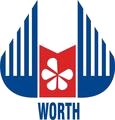Genesis
Soon after India’s independence, one of the biggest problems faced by the country was the scourge of leprosy. Many states had endemic population of leprosy affected people and there was no known cure or reliable treatment. Even after treatment they were treated as outcast and not given any employment.
Dr. Paul Brand
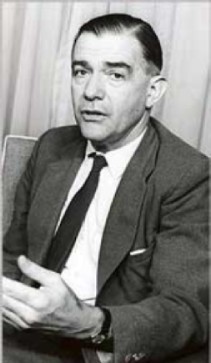 It was here that Dr. Paul Brand of Christian Medical College & Hospital, Mr. Olof Stroh of the Swedish Red Cross and Mr. C. Antony Samy (Former Managing Director of WORTH Trust) thought that it was not enough to provide treatment alone, but they must be given an opportunity to earn a living and thus be active members of the society they live in.
It was here that Dr. Paul Brand of Christian Medical College & Hospital, Mr. Olof Stroh of the Swedish Red Cross and Mr. C. Antony Samy (Former Managing Director of WORTH Trust) thought that it was not enough to provide treatment alone, but they must be given an opportunity to earn a living and thus be active members of the society they live in.
They stressed that the traditional activities recommended for those affected by leprosy, such as basket weaving, cloth weaving, pottery, candle making etc. are not suited for leprosy patients. It was decided that they should set up a modern engineering workshop to provide earning opportunity for the leprosy-cured persons.
When the rehabilitation industry started functioning in 1963, it had to take an unbeaten path. There was no precedent in India, or elsewhere, wherein those affected by leprosy were given livelihood training and employed productively.
Mr. C. Antony Samy
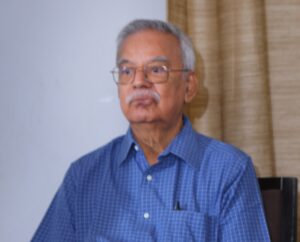
Mr. C. Antony Samy was given the most difficult and onerous task of training & employing the Leprosy-cured persons. His first responsibility was to choose the activity and machinery. With no readily available opportunities, he used his contacts to get sub-contract work from major South Indian groups like Standard Motors, TVS, Tube Investments (Currently Murugappa) etc.
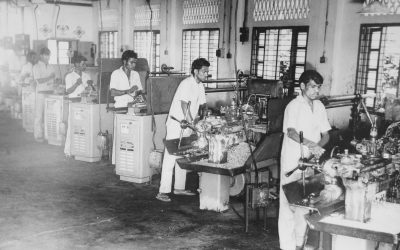
REHABILITATION WORKSHOP
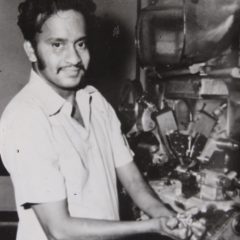
A LEPROSY-CURED PERSON AT WORK
Thanks to effective efforts of various organisations, leprosy was effectively controlled nationwide and the Trust’s activities started to focus on rehabilitation of those who suffer from Speech & Hearing, Orthopedic and Intellectual Challenges. When the workshop became economically self-sustained, it was renamed at WORTH Trust.
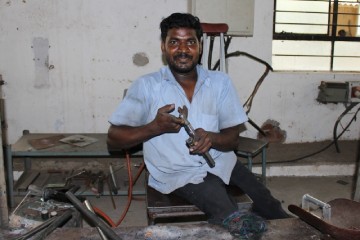
Persons with Disabilities are taught to be self-sufficient at WORTH Trust.
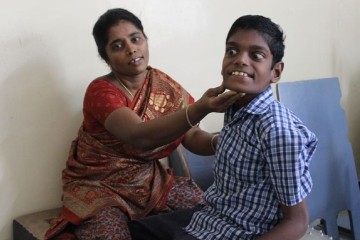
Kid at the Day Activity Centre for the Intellectually Challenged at the WORTH Trust.
Overview
WOrkshop for Rehabilitation and Training of the Handicapped (WORTH) was established nearly sixty years ago by the Swedish Red Cross
with the objective of rehabilitating leprosy cured persons generally ostracized by society, through industrial training and employment. WORTH Trust today is a fully self-sustained rehabilitation organization. The production centers, which employ mostly Persons with Disabilities, enable them to generate a surplus, with which the entire cost of its Technical Training Centers for the Speech & Hearing Impaired and Physically Challenged boys and girls, School for Speech and Hearing Impaired children, Early Intervention Centre for the Speech & Hearing Infants and Autism Spectrum Disorder, Day Activity Centre for the Intellectually Challenged children and outreach activities are met. Registered as a charitable Trust, WORTH is managed by a Board of Trustees made up of eminent persons in diverse fields, united in their common interest in the service of persons with disabilities.
Five of WORTH Trust – WORTH Braillers, WORTH Plastics, WORTH Industries – Katpadi, Pondicherry and Tiruchirapalli received ISO 9001 – 2015 accreditation for its excellence in quality standards – an unique honour, which the first rehabilitation institution in India to attain. WORTH Industries at Katpadi, Pondicherry, Tiruchirapalli and WORTH Plastics have also been accredited for IATF 16949: 2016.
From its inception, the Founders of WORTH Trust have believed that the Persons with Disabilities have as equal a right and ability to be valuable, productive members of a family and the society. The involvement of WORTH Trust in the community has changed the lives of so many Differently-Abled people and their families.
The Uniqueness of WORTH Trust is:
- It trains and rehabilitates Differently-Abled persons.
- It provides employment to Differently-Abled persons.
- It manufactures products for Differently-Abled persons.
- All the products manufactured are by the Differently-Abled persons.
- It is a fully self – sustaining organization.
